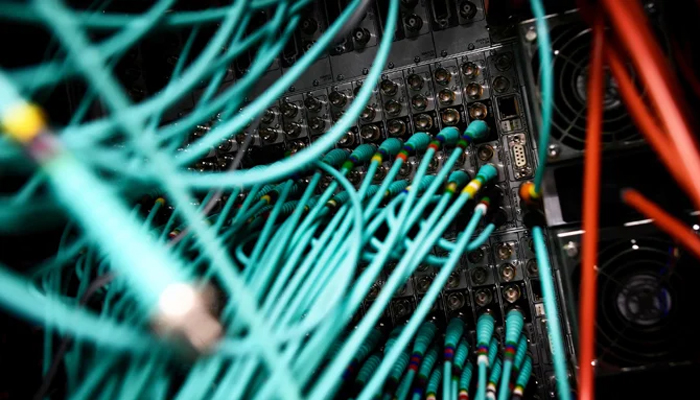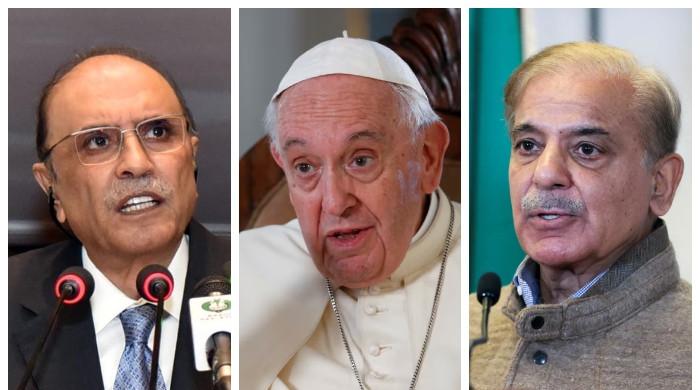LHC irked over state counsel's 'lack of knowledge' on internet disruptions
Court reserves verdict on plea seeking immediate restoration of internet access across country
August 16, 2024

- Millions across country continue to face trouble accessing internet.
- Govt attributes issue to purported testing of internet firewall.
- Court would issue orders for disruptions, says LHC judge.
LAHORE: The Lahore High Court (LHC) on Friday expressed displeasure over the state counsel's non-seriousness and "lack of knowledge" on the matter of the nationwide internet service disruptions that have been a burning issue in the country for weeks.
Justice Ahmad of the LHC took up a petition, seeking the immediate restoration of internet access across the country, filed by a citizen named Noman Sarwar against the "nationwide internet shutdown".
Millions across the country continue to face trouble accessing internet services due to limited connectivity, particularly while using mobile data in some regions.
The government has attributed the issue to the purported testing of an internet firewall to rein in social media which is equipped with filters that will block unwanted content from reaching a wider audience.
The federal government, Pakistan Telecommunication Authority (PTA), and other entities were nominated as respondents in the case.
At the outset of the hearing, the federal government's prosecutor Rana Noman sought time from the court to present a detailed report on internet disruption.
The court had directed the state counsel to take instructions from the relevant authorities and appear before the court today.
Taking the public official to task at his response, Justice Ahmed replied that it was a matter of public interest and the prosecutor’s "seriousness" in it reflected through his "lack of knowledge".
Later, the court reserved its verdict, with the LHC judge saying that the court would issue appropriate orders for the internet disruptions was a matter of public interest.
According to the petition, the internet and social media applications were shut down in the country without the authorities giving any notice or reason.
“Businesses and every sphere of life are being affected because of the internet’s closure. Shutting down the internet is also a violation of fundamental rights,” the plea said.
The plea, filed in the LHC, also demanded revocation of the federal government's "decision" to shut down the internet.
It may be noted that users of the widely used messaging application WhatsApp in Pakistan have also reported frustratingly long delays and failures when uploading and downloading content of all types.
'A cybersecurity measure'
Minister of State for Information Technology and Telecommunication Shaza Fatima Khawaja on Thursday said that a firewall was a cybersecurity measure "that every country in the world takes".
“An issue is created in the media and masses [out of nothing],” she said responding to a query about testing of an internet firewall after a meeting of the Senate Standing Committee on Information Technology and Telecommunication.
The minister said earlier a web management system was in place and currently its upgradation was happening to cope with cybersecurity threats.
“Look at the cybersecurity attacks being carried out on the country and the world as well. With the evolution of cybersecurity threats, states need to have a better capability to ensure that the threats are [well] responded to,” she said.
On the matter of internet slowdown, she said she had requested the internet service providers and the PTA to provide data related to traffic over the last two weeks.
“Once the data comes, we will be in a better position to say something,” she said.
Shaza clarified that the government was not in favour of the internet slowdown, rather it was working to upgrade it to 5G.
'Devastating effect on businesses, individuals'
Meanwhile, the Wireless and Internet Service Providers Association of Pakistan (WISPAP) has blamed the phenomenon on increased security and surveillance whose adverse repercussions might lead to severe economic repercussions.
Elaborating on the prevailing issue, the WISPAP chairman revealed that internet speeds witnessed around 30% to 40% reduction which has had a devastating effect on businesses and individuals who depend on reliable internet connectivity.
Highlighting the adverse effects of internet-related issues on online and electronic-related businesses, the chairman warned that these sectors, an essential pillar of the country’s digital economy, are now "struggling to maintain operations, and the slowdown is threatening their very survival".











